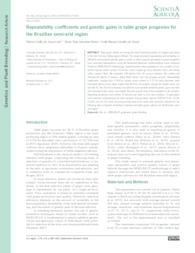Repeatability coefficients and genetic gains in table grape progenies for the Brazilian semi-arid region.
Repeatability coefficients and genetic gains in table grape progenies for the Brazilian semi-arid region.
Autoria: LEAO, P. C. de S.; NUNES, B. T. G.; SOUZA, E. M. C. de
Resumo: Table grape stands out among the main fruit-bearing plants of irrigated agriculture in the São Francisco Valley region of Brazil. This study estimated repeatability and heritability co-efficients and predicted genetic gains in order to select superior genotypes in grape progenies from controlled hybridizations using the Restricted Maximum Likelihood/Best Linear Unbiased Prediction (REML/BLUP) methodology. Individual plants were evaluated for the variables of production (kg per plant), number of bunches, bunch weight (g), berry diameter (mm), and soluble solids content (°Brix). We evaluated 194 hybrids from 30 crosses between Vitis vinifera and interspecific hybrids in Juazeiro, Bahia State, Brazil, over four growing seasons. Repeatability coefficients, ranging from 0.164 for soluble solids content to 0.72 for berry diameter, were estimated with accuracy values higher than 80 % for all variables, except for soluble solids content (66 %). The 30 best individuals classified for each variable exhibited genetic gains and their new estimated mean values were higher than the overall mean of the population in all variables. Regarding production and number of bunches per plant as the main variables, 15 genotypes were selected simultaneously for both variables. Among which, hybrids CPATSA 15.05, 15.06, 15.06T, and 23.103 stand out because they have trace seeds and should be selected for the following steps of genetic breeding to develop new table grape cultivars for the Brazilian semi-arid region.
Ano de publicação: 2018
Tipo de publicação: Artigo de periódico
Unidade: Embrapa Semiárido
Palavras-chave: Grapes, Hibrido, Melhoramento Genético Vegetal, REML BLUP, Uva, Uva de mesa, Vale do São Francisco, Vitis
Observações
1 - Por padrão são exibidas publicações dos últimos 20 anos. Para encontrar publicações mais antigas, configure o filtro ano de publicação, colocando o ano a partir do qual você deseja encontrar publicações. O filtro está na coluna da esquerda na busca acima.
2 - Para ler algumas publicações da Embrapa (apenas as que estão em formato ePub), é necessário ter, no celular ou computador, um desses softwares gratuitos. Sistemas Android: Google Play Livros; IOS: iBooks; Windows e Linux: software Calibre.
Acesse outras publicações
Acesse a Base de Dados da Pesquisa Agropecuária (BDPA) para consultar o acervo completo das bibliotecas da Embrapa.

